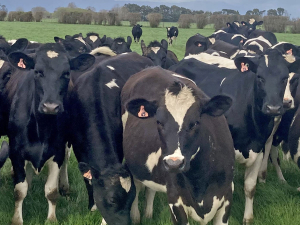Fonterra’s exit from Australia ‘a major event’
Fonterra’s impending exit from the Australian dairy industry is a major event but the story doesn’t change too much for farmers.
 Fonterra recently announced its opening milk price forecast for the 2025 season – a range of $7.25 to $8.75/kgMS.
Fonterra recently announced its opening milk price forecast for the 2025 season – a range of $7.25 to $8.75/kgMS.
A Waikato accountant says dairy farmers putting together their budget for 2025 won’t have much to cheer for even with an $8/kgMS forecast milk price.
Waipa-based Jarrod Godfrey, associate partner at Findex Waikato is encouraging dairy farmers to advocate strongly for something better from Fonterra – a material improvement in real milk prices.
Godfrey says that in real terms, these milk prices are not materially different to what was paid to farmers 20 years ago.
Fonterra recently announced its opening milk price forecast for the 2025 season – a range of $7.25 to $8.75/kgMS, with a midpoint of $8/kgMS. The co-op’s 2023-24 forecast midpoint remains unchanged at $7.80/kgMS.
“Most dairy farmers will be putting together their budget for 2025, and it probably doesn’t show much joy for the next 12 months, even with an $8 milk price,” Godfrey says.
“In real terms, milk prices have not changed much over the past 20 years and combined with farm expense inflation and recent high interest rates, budgets will be looking fairly tight for the next 12 months.”
For an average 124ha Waipa dairy farm, peak milking 370 cows, a milk price of $8/kgMS will be below the break-even point of $8.20. This means an operating deficit of $28k – before any allowance for debt repayment or capital expenditure.
“For any business, there has to be ongoing sustainable growth in revenues, otherwise your margins get squeezed. Dairy farmers have carried the burden of reducing margins over the past 20 years – which restricts the ability of growth and development at a grass roots level” he says.
“We encourage all farmers to put together a budget for the upcoming season, so plans can be made now to navigate the tighter cash flow periods. This will provide farmers with some comfort – but will also provide them with some ammunition when they advocate for better returns from their processors.
“There has to be material improvement in the returns from primary industry – on real terms and for the longer term – to keep the wider rural sector sustainable.
“Unfortunately, the 2025 budgets won’t have much in the way of discretionary spending, with expected reductions in areas such as repairs, capital expenditure, debt repayment and personal spending,” he says.
Godfrey says having knowledge of what the cashflow budget looks like for 2025 and beyond will help farmers and other business owners to prepare.
“The agribusiness industry continues to grow and develop with the help of technology advancements. These developments mean that farmers are better placed now than ever before to react more quickly to adverse events, including price changes. These tools often include farm financial tools such as Xero/Figured,” he says.
“Taking steps now to budget for next season will help you navigate the expected cashflow challenges. And when processors deliver the desperately needed real growth in prices, you will be well placed to take a firm grip on those future profits.”
Fonterra’s impending exit from the Australian dairy industry is a major event but the story doesn’t change too much for farmers.
Expect greater collaboration between Massey University’s school of Agriculture and Environment and Ireland’s leading agriculture university, the University College of Dublin (UCD), in the future.
A partnership between Torere Macadamias Ltd and the Riddet Institute aims to unlock value from macadamia nuts while growing the next generation of Māori agribusiness researchers.
A new partnership between Dairy Women’s Network (DWN) and NZAgbiz aims to make evidence-based calf rearing practices accessible to all farm teams.
Despite some trying circumstances recently, the cherry season looks set to emerge on top of things.
Changed logos on shirts otherwise it will be business as usual when Fonterra’s consumer and related businesses are expected to change hands next month.

OPINION: Here w go: the election date is set for November 7 and the politicians are out of the gate…
OPINION: ECan data was released a few days ago showing Canterbury farmers have made “giant strides on environmental performance”.